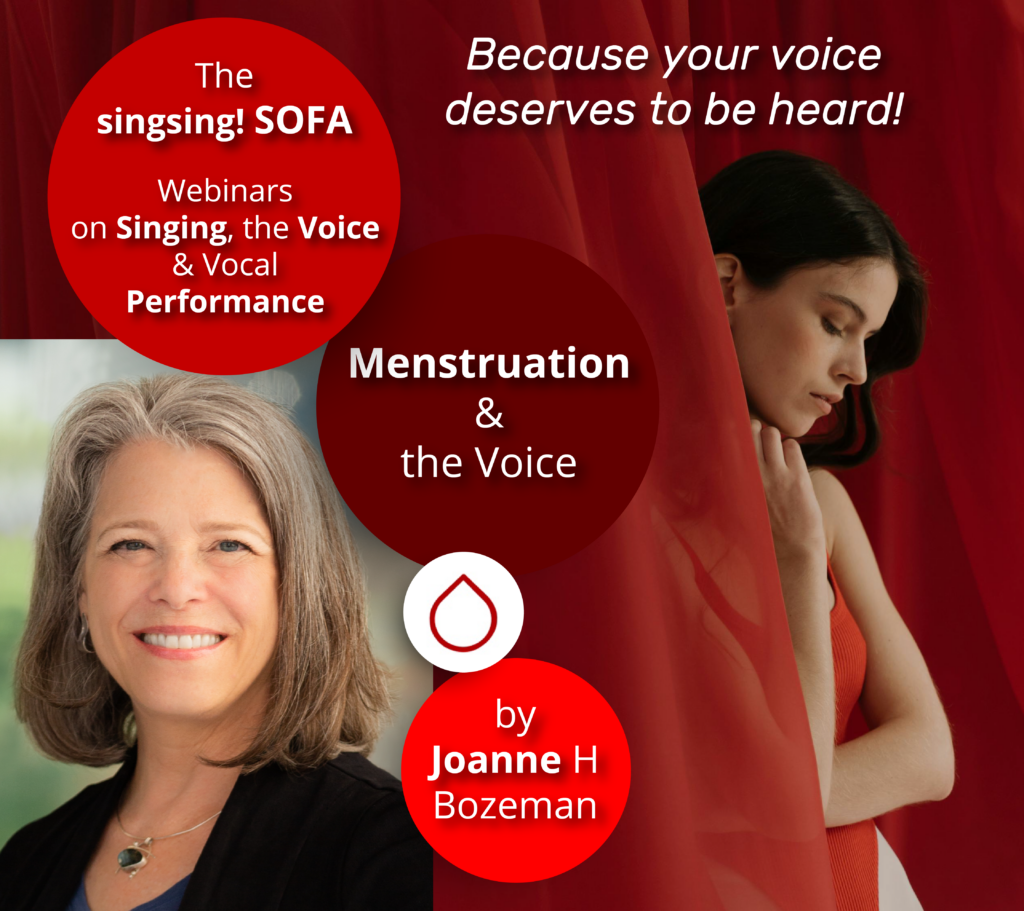
The Menstrual Cycle and its Impact on the Singing Voice
28/04/2024
Have you ever noticed changes in your voice throughout your menstrual cycle? Understanding these ups and downs can help you keep your voice healthy and your performance on point.
We recently sat down with Joanne Bozeman in the webinar Menstruation & the Voice – History, Research and Practical Guidance.
Joanne shared a ton of valuable insights on how menstruation can affect the singing voice — way more than we can cover here! To catch all the details, including a deep-dive Q&A in which we also talked about (peri-)menopause, pregnancy and other related subjects, make sure to subscribe to The singsing! Sofa Library and watch the full 1.5-hour session.
Here’s a quick rundown of what we talked about:
Understanding the Menstrual Cycle and Its Phases
The menstrual cycle has several phases, each with its own hormone levels. These hormonal changes can affect your voice in different ways.
- Follicular Phase
This phase starts on the first day of menstruation and ends with ovulation. Estrogen levels gradually rise as follicles in the ovaries develop, while progesterone remains low. Androgen levels also increase slightly, contributing to the growth of the follicles. - Ovulatory Phase: Mid-cycle, a surge in luteinizing hormone (LH) triggers ovulation, where a mature egg is released. Estrogen reaches its peak just before ovulation, then dips slightly. Androgens remain relatively stable. Progesterone levels begin to rise after ovulation.
- Luteal Phase
After ovulation, the ruptured follicle forms the corpus luteum, which secretes progesterone, causing its levels to peak. Estrogen levels rise again, but not as high as during the follicular phase. If pregnancy does not occur, both estrogen and progesterone levels drop, leading to menstruation. - Menstruation
The cycle resets as the lining of the uterus sheds, marking the start of menstruation. Hormone levels, including estrogen, progesterone, and androgens, are at their lowest during this phase.
How hormone levels can affect your voice
Joanne gave us an in-depth look at how each hormone can impact your voice. Many singers feel their voices are at their best during the follicular phase. You might find your voice is strong, reliable, and that you have good control and range.
In the late luteal phase – ca. 4 days before the period, a percentage of singers may notice voice symptoms. Here are some examples:
- Vocal fatigue
- Dryness
- Difficulty in the high range
- A feeling of voice “sluggishness”.
Your voice might require more effort and feel less stable. It can be harder to keep the same level of vocal control as during the follicular phase. Sometimes these symtoms continue into the first few days of the period before resolving. Joanne helped us understand why these symptoms may occur.
She also covered how hormonal imbalances – different from a standard menstrual cycle – might impact your vocal folds and potentially cause changes in your voice.
If you’re interested in understanding how each hormone can contribute to certain vocal symptoms, make sure to watch the webinar!
The Role of Pain Medication and Associated Risks
We also talked about how to manage menstrual discomfort. Joanne highlighted some risks with certain pain medications, especially NSAIDs (nonsteroidal anti-inflammatory drugs) like aspirin, ibuprofen and naproxen sodium. In my blog post How Do You Take Care of Your Voice?, I go more into detail about those risks.
As the possible effects of pain killers and many other medications on the voice is a very important topic, I have invited phoniatrician & laryngologist Dr. Lieve Delsupehe to lead the webinar What You Should Know About the Sometimes Unexpected Effects of Medications on Your Voice. Subscribe to The singsing! Sofa Library and get immediate access to the recording!
Joanne suggests talking to your healthcare provider to find safe ways to manage pain without risking your vocal health.

Strategies for Managing Menstrual-Related Vocal Changes
Joanne shared lots of practical tips for dealing with voice changes during your menstrual cycle. Here are a few key ones:
- Hydration:
Keep your vocal folds well-hydrated by drinking plenty of water to combat dryness. A nebulizer provides topical hydration during the most challenging days. - Rest:
If your voice feels affected in the time before and during your period, try to rest your voice and use the time to do mental practice or memory work. - Vocal Awareness:
Tracking how your voice changes throughout your cycle can help you plan and adjust. Joanne suggested that this awareness can help you schedule performances and rehearsals when your voice feels its best, if possible. If you have to perform on less-than-ideal days: Adapt. Maybe switch up your songs, adjust the keys, or create a more intimate, less physically demanding version of your setlist. You’ll save energy and protect your voice.
Embracing the Natural Rhythm of Your Voice
By recognizing how your menstrual cycle can affect your voice, you can approach your singing with more awareness and care. Joanne Bozeman emphasized that hormonal fluctuations are a normal part of life, and learning to work with them rather than against them can help you keep your voice healthy and strong.
To get the full scoop on Joanne Bozeman’s insights and advice, subscribe to The singsing! Sofa Library and watch her webinar Menstruation & the Voice – History, Research and Practical Guidance.
It’s packed with information that will help you navigate the natural changes in your voice, so you can keep performing at your best!

So much of the women's health issues discussed are relevant and things that my singer friends and I talk about and have questions about!
Megan Pfeiffer Miller, MM, Soprano and Voice Teacher
Megan Pfeiffer Miller, MM, Soprano and Voice Teacher

As always, feel free to send me your thoughts, questions, and feedback in the comments below this blog, via the contact form or in the singsing! online community
Cordially,
Sarah


